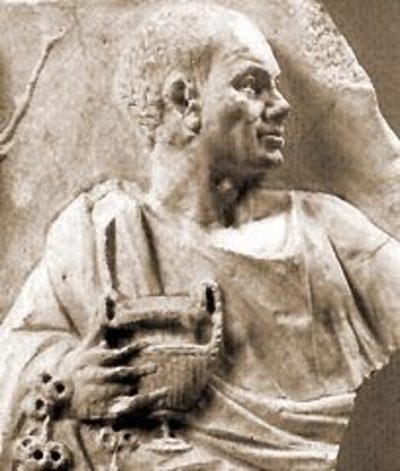Horace Ode I.16
Translated by Steven J. Willett

This is a possible Roman portrait of Horace with his drinking cup and balding head.
Note: The relationship between the mother and daughter in the ode is unclear. It’s possible that Horace wrote scurrilous verses and gave them to the mother with whom he once had an affair, but now wants the daughter to destroy them and become his lover. The possibility of one or two love relationships sinks into the burlesque foreground. Horace mocks everything from standard mythology, religion, philosophy and even a creation myth to explain human anger. In the sixth stanza he recommends a simple morality that would appeal to the Hellenistic age.
The Latin text follows after the page break.
O daughter fairer far than your mother fair, appoint whatever end you desire to all my scurrilous verses, whether flames may please you or waves of the Adriatic. Not Cybele on Dindymus’ heights, not that indwelling god of Delphi so shakes the priests, not Bacchus, not the Corybantes suddenly clashing their strident cymbals, as grim-faced anger, which neither Noric sword deters nor ship-annihilating ocean storms, nor savage fire nor Jove himself with terrifying din as he plunges earthward. Prometheus, it’s said, was constrained to fill our primal clay with particles cut from all the animals and put inside our stomach the violence of raging lions. Wrath brought Thyestes low to a heavy doom and is decreed the ultimate cause why all proud cities finally fall to utter ruin and arrogant armies furrow exultantly through walls with their hostile plow. Restrain your moods: a furious passion once attacked me also during youth’s sweet springtime, and drove me in white-hot madness to reckless verses; now I desire to change those bitter words for gentle, if you will be a friend again and offer back (my slander recanted in song) your heart’s love.
Pages: 1 2

First the mother and, then, the daughter;
“He also discovered that his predecessor had acquired the next-door neighbor’s wife as mistress and had been making ‘progress’ with her teen-age daughter as reinforcement for her mother’s efforts…” Tattoo, pg. 243.
Plus ça change, plus c’est la même chose.
Empirically, it is hard to fit in a goal-rational w0rld as a value-rational>/I> person. Honor to those who try.
Ishmael Zechariah